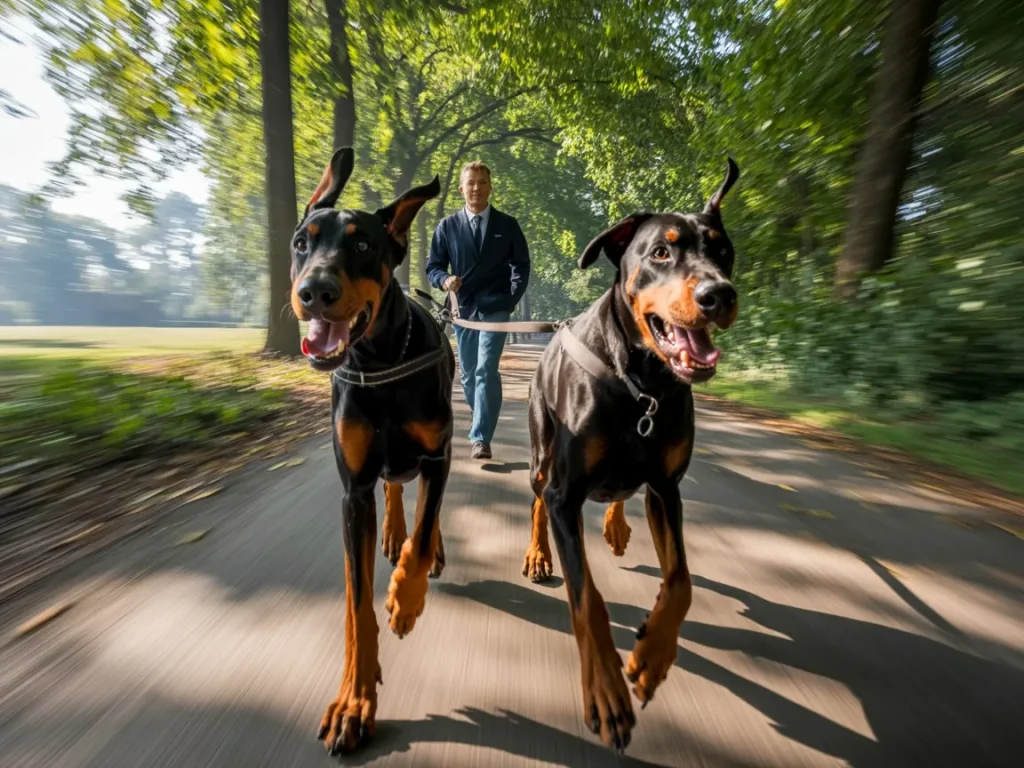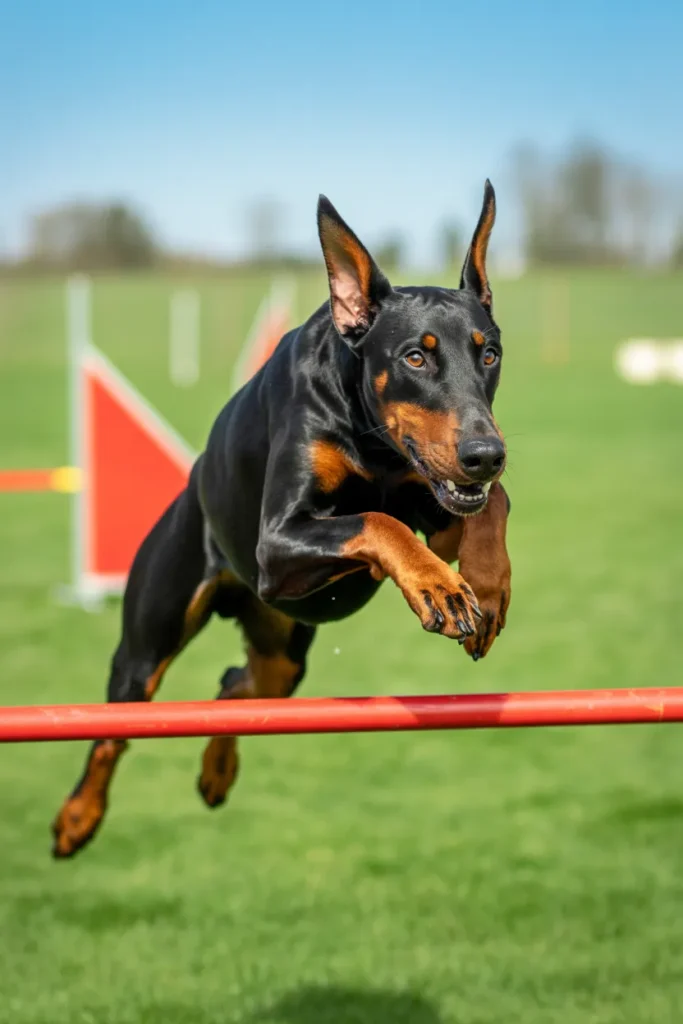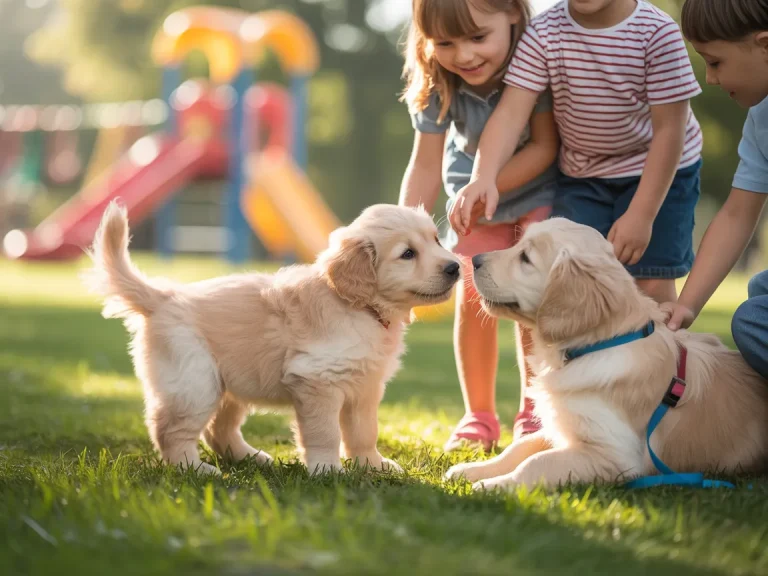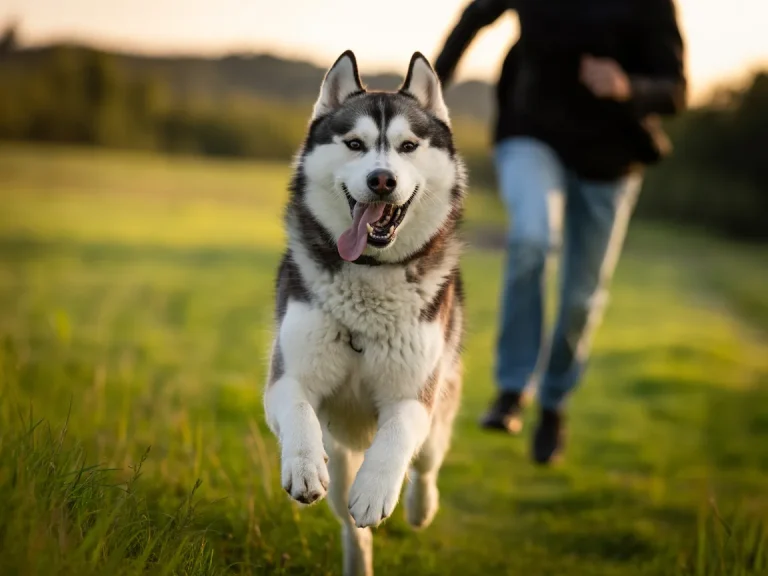Dobermans? You can spot them a mile away. With their sleek, muscular frames and that “I’m ready for anything” posture, they’re like the elite athletes of the dog park. But here’s the thing: under that polished exterior is a devoted buddy who’s equal parts brains, loyalty, and a dash of goofy personality.
Thinking about adding a Doberman puppy to your family? Or maybe you’re just curious about what makes these dogs so special? Let’s dive into what life with a Doberman is really like.

The History Behind the Doberman Pinscher
Imagine being a tax collector in 1800s Germany, wandering through rough neighborhoods with coins rattling in your pockets. That was Karl Friedrich Louis Dobermann, and he decided he needed a dog who’d have his back.
He set out to create the perfect companion and protector, blending breeds like the Rottweiler, Weimaraner, and German Pinscher. The result? A dog that’s smart, loyal, and courageous enough to stick by your side no matter what.
If you want to read more about Doberman origins, check out the American Kennel Club’s detailed history.
Dobermans quickly found themselves working with police and military units, proving their worth as both guardians and devoted companions. Over time, breeders shaped them into what they are today: a dog who can guard your home without blinking an eye, then flop onto the couch for snuggles at night.

Appearance and Physical Traits
If a Doberman were a suit, it would be a well-tailored one — sleek, close-fitting, and ready for action.
These dogs are lean, muscular, and built for speed and agility, weighing in anywhere from 60 to 100 pounds, with the Doberman boys often tipping the heavier end. Their short coat hugs their body and comes in colors like the classic black and rust, but you’ll also see blue, red, and fawn Dobermans strutting around.
Their sleek coat is a bonus for those who don’t want to wrestle with endless grooming. Sure, they shed (all year, in fact), but a quick weekly brush usually keeps them looking sharp and helps keep the tumbleweeds of fur around your home under control.

Personality: Brains, Loyalty, and Energy
Ever met a dog that could probably outsmart you if they had thumbs? That’s a Doberman for you.
These dogs are sharp as a tack and love a good challenge. Whether it’s learning new commands, mastering puzzle toys, or running agility courses, Dobermans thrive when their brains are put to work. If you’re the kind of family who enjoys getting outside for adventures or training sessions that feel like games, a Doberman will be right there, tail wagging, ready to join in.
And when it comes to loyalty? They’re ride-or-die companions. Many Dobermans form a deep bond with one or two people in the family, becoming their shadow around the house. They’re naturally protective, but not the kind to pick fights without a reason. Early socialization is your secret weapon here — getting your Doberman puppy comfortable with new sights, sounds, and people will help them grow into a confident adult who knows when to be on guard and when to relax.
Despite their bodyguard reputation, Dobermans are affectionate softies at heart. They crave companionship and don’t do well being left alone for long stretches. Without enough play, mental stimulation, and interaction, they can get bored — and a bored Doberman might decide your couch is the perfect chew toy or that barking at every squirrel is a new hobby.
Raising a Doberman Puppy: What to Expect
Bringing home a Doberman puppy feels a bit like adopting a furry toddler who’s turbo-charged with curiosity and energy.
Those first weeks? It’s all about setting the groundwork. Start with simple routines: consistent potty breaks, short training sessions, and lots of gentle exposure to different sights, sounds, and people. Teaching leash manners early will save your shoulders down the road, trust me.
When it comes to training, keep it positive. Dobermans are eager to please and respond best to praise, treats, and your encouragement. Harsh corrections can backfire, creating confusion or fear in a dog that’s smart enough to remember every experience.
Thinking about puppy classes? Go for it. They’re not just about teaching sit and stay — they’re a golden opportunity to help your pup develop social skills and confidence. If you’ve got kids in the house alongside your Doberman boys, supervise those early interactions. Teach your kids how to respect the puppy’s space, and you’ll build a bond that’s strong and safe for everyone.

Exercise and Mental Stimulation
If you’re looking for a couch potato, a Doberman isn’t it. These dogs come with built-in batteries that don’t run out easily.
They need daily exercise to stay happy and sane — think brisk walks, games of fetch in the yard, or a fun agility course to keep them on their toes. But it’s not just their bodies that need a workout. Their sharp minds crave challenges, too. Puzzle toys, scent games, or advanced training sessions are like brain gym for your Doberman.
Ever seen a bored Doberman? They’ll find something to do — and you might not like their choices. Chewing, barking, or digging aren’t “bad behavior” for them; it’s just them saying, “Hey, I need a job!” Keep their body and mind busy, and you’ll have a much calmer, happier companion.
Health and Lifespan
Dobermans usually live around 10 to 13 years, filling those years with loyalty and energy. Like all breeds, they’ve got a few health concerns you should keep an eye on:
- Dilated Cardiomyopathy (DCM): A serious heart condition.
- Von Willebrand’s Disease: A blood clotting disorder.
- Hip Dysplasia: Common among large breeds.
- Hypothyroidism: Manageable but requires monitoring.
Regular vet visits, a quality diet, and keeping them at a healthy weight can help manage or even prevent some of these issues. When choosing a breeder, pick one who does genetic testing and offers health clearances for both parents — it’s worth it for your peace of mind and your dog’s future.
Feeding your Doberman a diet that suits their age and activity level will keep them in top shape. And don’t forget about dental care, joint support, and weight management, especially as they get older and start slowing down just a bit.
For a thorough rundown on Doberman health issues and tips, see the AKC Doberman health guide.
Is a Doberman Right for You?
Dobermans aren’t for everyone, and that’s okay. They need time, patience, and commitment. But if you’re looking for a loyal, intelligent, and active partner who’ll stick by your side, a Doberman could be your perfect match.
Want a deeper dive into Doberman traits and care? This Wikipedia article covers the essentials.
They don’t do well as “background dogs.” They want to be part of your daily life, whether that’s helping you in the garden, following you around the house, or curling up next to you after a busy day. If you’re an experienced dog owner — or ready to learn and put in the work — a Doberman will reward you with a bond like no other.

Living with a Doberman: Daily Life and Home Setup
Dobermans want to be where you are, whether that’s the kitchen, the home office, or the driveway while you wash your car. They’re not content to watch the world from the sidelines.
It’s important to set up a secure, cozy space for your Doberman at home. A sturdy dog bed in a quiet spot gives them a safe place to rest, and crate training can help provide structure and security.
Because of their short, sleek coats, Dobermans feel the cold easily. In chilly climates, a snug dog jacket will make winter walks more comfortable. Inside, make sure their resting area is warm and draft-free, especially for puppies and seniors.
One of the bonuses? Dobermans are naturally clean dogs. They pick up house training quickly and don’t tolerate messy beds. Stick to a simple routine, and your Doberman will adapt quickly to your household’s rhythm.
Socialization and Interactions with Other Pets
Want a well-adjusted Doberman? Early socialization is key. Exposing them to new sights, sounds, people, and animals helps them build confidence and prevents future behavioral headaches.
With proper introductions, many Dobermans do great with other dogs, especially if they’re raised together. That said, male Dobermans (particularly intact ones) may show dominance toward other males, so supervised introductions and clear boundaries are important.
When it comes to cats or smaller pets, early exposure and positive reinforcement can help them coexist peacefully. Many Dobermans end up being best buddies with the household cat, but it takes time and guidance.
They’re naturally protective, which means they might be wary of strangers at first. They’re not looking for trouble, but they are watchful. Reinforce calm, confident behavior when guests arrive, and you’ll help your Doberman learn the difference between a real threat and the mail carrier.

Travel and Outdoor Adventures with a Doberman
If you love road trips or outdoor adventures, your Doberman will be thrilled to join you. They love car rides and exploring new places with their family.
Their stamina makes them ideal partners for hikes, nature walks, or jogs. If you’re active, your Doberman will match your energy, but remember to bring water and avoid long outings in extreme weather.
They also excel in dog sports like obedience, Schutzhund, and rally, giving them a positive outlet for their energy and smarts while strengthening your bond.
Final Thoughts
Dobermans are a breed of contrasts: elegant yet powerful, protective yet affectionate, and focused yet playful. For over a century, they’ve captured the hearts of those looking for a dog who’s as stylish as they are loyal.
With the right training, socialization, and environment, a Doberman becomes more than just a pet — they become a partner, a guardian, and a true family member. If you’re ready to welcome a Doberman into your life, prepare for a bold spirit and a loyal heart that will stick by your side through every chapter.
Disclaimer:
This article is for informational purposes only and doesn’t replace professional veterinary or training advice. Always consult a certified vet or dog trainer for guidance specific to your pup.

